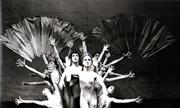Equus - Segal Centre of Arts
Raw Equus
A boy who did unspeakable things to horses
By: Dan Laxer
The Segal Centre for the Performing Arts is very excited about its upcoming production of Peter
Shaffer’s Equus. They’ve gone to great lengths to foreground the background, promoting the behindthe-
scenes machine that brought the play to fruition.
It’s a difficult piece which tackles many of the themes that informed the work of Sigmund Freud. Equus
spoke to a generation who came to Freud very much as a by-product of the search for meaning that
suffused the early 1970s. That generation would remember the movie version with Richard Burton in
the role of Dr. Dysart, the psychiatrist who loses himself in the psychosis of the youth who did
unspeakable things to horses.
The current generation will know Equus because Daniel Radcliffe, the young actor who came of age
while playing Harry Potter, starred as Alan Strang in the West End revival, which eventually made it to
Broadway. That particular production ruffled feathers because Radcliffe, whom a generation came to
know as the boy wizard, appeared on stage naked, as the script requires, even though he was
technically still a minor. Manly, with ripped abs. But a minor just the same.
Peter Shaffer had heard the story of a young man who’d stabbed horses, as his Alan Strang does in
Equus. He struggled with why a boy would do such a thing, a question we ask anytime a kid with a
gun walks into a school. The play is very much of product of its time and place, with themes of
psychoanalysis, inner searching, and British postwar class consciousness.
But a beautiful piece of theatre nonetheless rendered more so by director Domy Reiter-Soffer. He
came to town a few weeks early to meet with the design crew to go over sets, lighting, costuming. He
shared his vision, but made sure to let each designer’s ideas inform the final concept. There are
indeed horses, in the guise of professional dancers.
Reiter-Soffer really opened up the play, says assistant director Rachelle Glait. It’s a dark, heavy piece,
she explains, “but there’s actually quite a bit of comedy in it, too.” It’s hard to imagine, though, where
in such a disturbing story one finds what might pass for comedy.
The lead character, Dr. Dysart, is man in the twilight of his years, feeling his own, passionless
existence being drawn in and enveloped by the passion, as it were, of his young, psychotic patient.
Many great actors have taken on the role, from Anthony Hopkins on Broadway, to Richard Burton on
film, and Brian Bedford on the Stratford stage in Ontario. Jean Marchand tackles the role at the Segal,
opposite Dan Jeannotte, whom Glait calls “a once in a lifetime discovery,” as Alan.
![/images/pictures/Sarah[1].jpg](../images/pictures/Sarah%5b1%5d_thumbnail.jpg)
